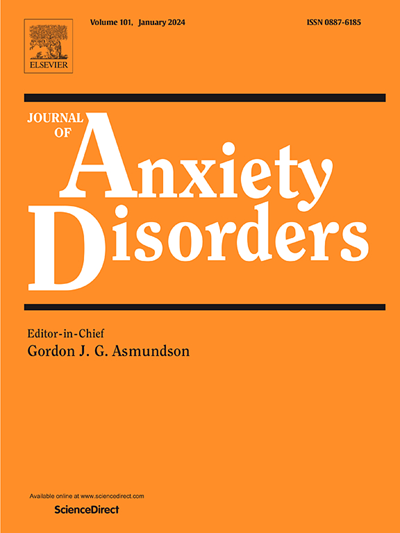Excessive avoidance bias towards uncertain faces in non-clinical social anxiety individuals
IF 4.5
2区 医学
Q1 PSYCHIATRY
引用次数: 0
Abstract
Previous survey studies have consistently shown a strong link between social anxiety and intolerance for uncertainty. However, this association lacks empirical validation from laboratory investigations. To bridge this gap, we conducted a study utilizing the ultimatum game task to assign distinct social connotations (egoistic, altruistic, and uncertain) to three initially neutral faces. Subsequently, we utilized the Approach-Avoidance Task (AAT) paradigm to evaluate participants' approach-avoidance tendencies towards the faces with varying social meanings. Additionally, we collected data on participants' levels of social anxiety and trait anxiety. Our results indicate that both social anxiety and trait anxiety levels impact individuals' avoidance behaviors when faced with socially uncertain cues. This suggests that individuals with higher levels of social anxiety may demonstrate increased sensitivity to uncertainty in social contexts, leading to avoidance behaviors. Crucially, our findings directly underscore the heightened avoidance tendencies of non-clinical individuals with social anxiety towards socially uncertain stimuli, thereby providing new empirical support for research on anxiety disorders related to uncertainty.
非临床社交焦虑症患者对不确定面孔的过度回避偏差。
以往的调查研究一直表明,社交焦虑与对不确定性的不容忍之间存在密切联系。然而,这种关联缺乏实验室调查的经验验证。为了弥补这一不足,我们利用最后通牒游戏任务为三个初始中性面孔赋予不同的社会内涵(利己主义、利他主义和不确定性)。随后,我们利用 "接近-回避任务"(AAT)范式来评估参与者对具有不同社会含义的面孔的接近-回避倾向。此外,我们还收集了有关参与者社交焦虑和特质焦虑水平的数据。我们的研究结果表明,社交焦虑和特质焦虑水平都会影响个体在面对社交不确定线索时的回避行为。这表明,社交焦虑水平较高的人可能会对社交情境中的不确定性表现出更高的敏感性,从而导致回避行为。最重要的是,我们的研究结果直接强调了非临床社交焦虑症患者对社交不确定性刺激的回避倾向,从而为与不确定性相关的焦虑症研究提供了新的经验支持。
本文章由计算机程序翻译,如有差异,请以英文原文为准。
求助全文
约1分钟内获得全文
求助全文
来源期刊

Journal of Anxiety Disorders
Multiple-
CiteScore
16.60
自引率
2.90%
发文量
95
期刊介绍:
The Journal of Anxiety Disorders is an interdisciplinary journal that publishes research papers on all aspects of anxiety disorders for individuals of all age groups, including children, adolescents, adults, and the elderly. Manuscripts that focus on disorders previously classified as anxiety disorders such as obsessive-compulsive disorder and posttraumatic stress disorder, as well as the new category of illness anxiety disorder, are also within the scope of the journal. The research areas of focus include traditional, behavioral, cognitive, and biological assessment; diagnosis and classification; psychosocial and psychopharmacological treatment; genetics; epidemiology; and prevention. The journal welcomes theoretical and review articles that significantly contribute to current knowledge in the field. It is abstracted and indexed in various databases such as Elsevier, BIOBASE, PubMed/Medline, PsycINFO, BIOSIS Citation Index, BRS Data, Current Contents - Social & Behavioral Sciences, Pascal Francis, Scopus, and Google Scholar.
 求助内容:
求助内容: 应助结果提醒方式:
应助结果提醒方式:


